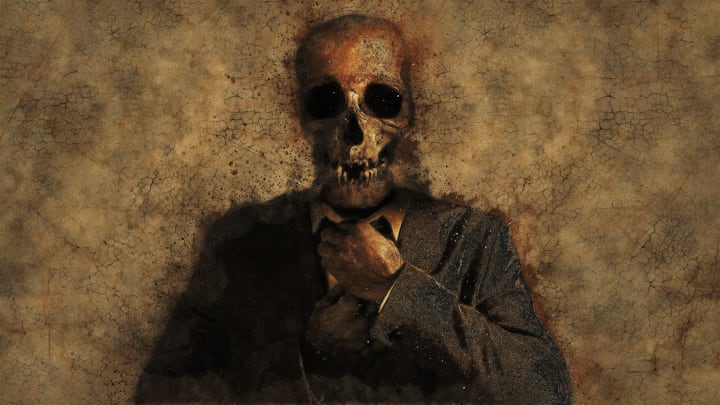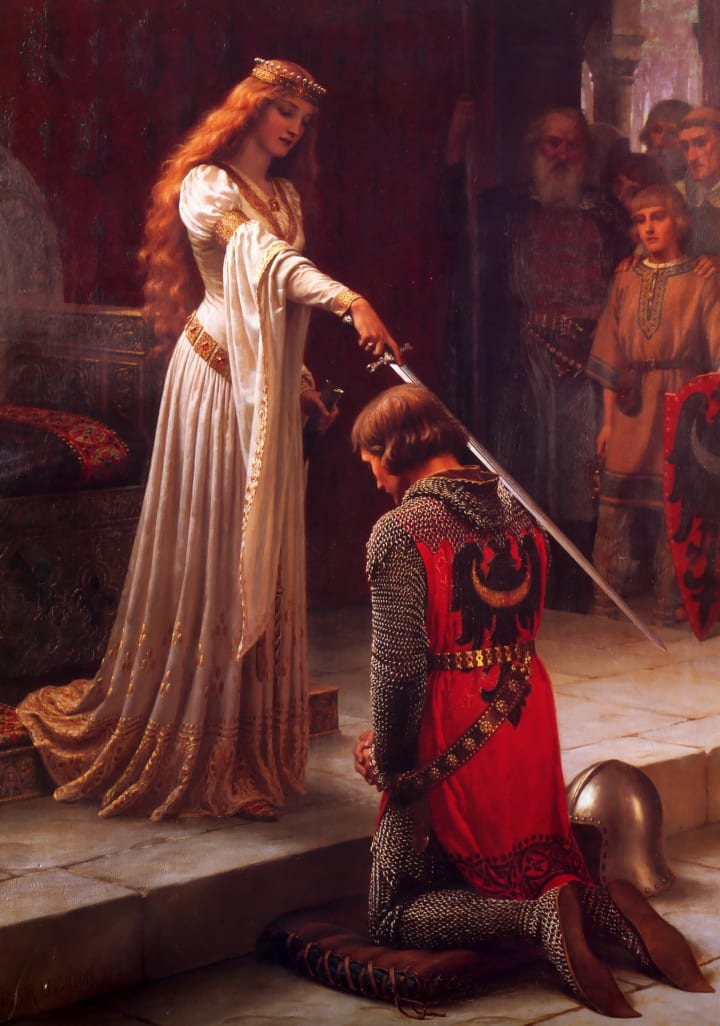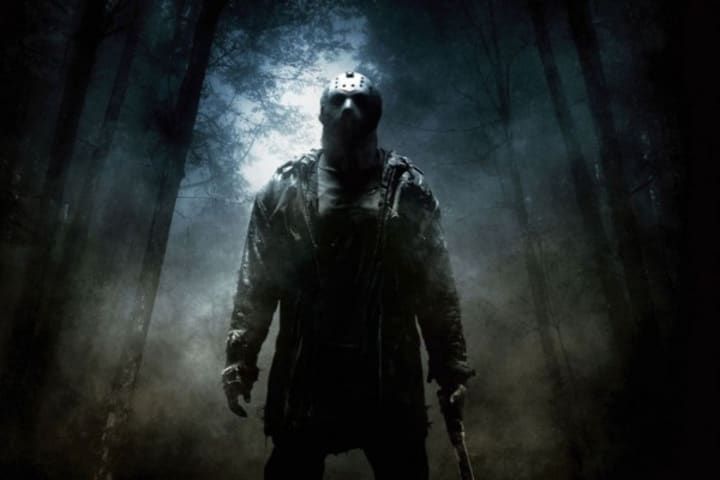5 Tips for Playing Better Evil Characters
Walking The Left Hand Path in RPGs

When we sit around a table with our favorite RPG, we can take on the roles of some of the greatest heroes in the land. From powerful wizards and noble warriors, to mysterious rangers and light-fingered thieves, these characters come in a wide variety of forms.
Sometimes you don't want to play the hero, though. You don't even want to tread that middle ground where calculating mercenaries and selfish hard cases make their homes. No, you want to see what lurks in the shadows, and to boldly put a capital "E" in your character's alignment box.
Before you start plotting out a campaign of necromantic world domination or sharpening the stakes for your enemies, though, I'd recommend taking a few of these tips to heart. They're going to help you a lot in the long-run.
If you like this list, then you may want to check out some of the others like it in my 5 Tips master list! Also, don't forget to check out my full Vocal archive for more articles about gaming and general geekery!
Tip #1: What Is Your Motivation?

We are gonna start some shit today...
No one is evil just for the sake of being evil. Everyone is motivated by driving goals; evil characters just tend to be the ones who keep their options open for the methods they'll use to achieve those goals.
So take a moment and ask what the things that drive your character are. For instance, do they seek material wealth? Social position? Do they serve an organization or a cause? Do they seek only to fulfill their own needs, like a thirst for battle, or a desire for vengeance on a particular person, nation, or group? Something has to get them out of bed in the morning, so what is it?
One of the first mistakes that a lot of players (especially players who are very new to evil characters) make is to have a cartoonish sort of evil that commits atrocities not because these acts further their goals, or because they make sense, but simply to push the envelope. That isn't going to help your cause, and if anything it will likely get your character killed a great deal faster, so make sure you understand why your character does the things they do.
Tip #2: Does Your Character Know They're Evil?

For your commission of heinous acts in service of our nation, I dub thee Sir War Crimes.
Alignment is one of those slippery meta concepts that doesn't really translate to the game world. Unless you have some magical means of detecting a person's alignment and the aura they give off, then it really is just a matter of opinion. Those of us sitting around the table, though, know the truth.
As I said in "If Your Character Is Evil, Own It!" most people don't think of themselves as evil. Even (or especially) when they are. So ask how your character justifies their wickedness, and sleeps well at night.
For example, were you raised in and around slavery, taught that the weak wear chains and the strong hold the lash? This mindset could allow you to not just participate in but defend such an atrocious institution. Are you driven to win a conflict at any cost, believing that no tactic is too reprehensible and no weapon too devastating to unleash, even if it means you're ruling over a land of ashes and bones? Do you ascribe to the theory that "evil" is just a word used to describe power that is too strong for the weak-willed and feeble-minded to harness and control, leading you to collect and use forbidden grimoires and outlawed spellbooks?
Just because your character is evil, that doesn't mean they're a monster. They might simply be very good at justifying acts of brutality, oppression, and wickedness to themselves. And in some cases, they might even feel that they're doing good in the world. From assassins who prize their own neutrality while still accepting coin in exchange for a life, to torturers who tell themselves they're serving a greater good, there are all sorts of options to touch on here.
Tip #3: How Do You Remain at Large?

The Grave Dancers are much feared... but never found.
Even if everyone in the party is playing an evil character—unless you are also playing in a realm/region that swings toward the evil alignment—your actions are going to get you a lot of unwanted attention. From paladins and knights errant, to bounty hunters looking to make a big score, evil characters have a lot of potential threats dogging their trail. Threats that just being a player character won't protect you from.
That's why the best villains (or at least the ones who live the longest) are the ones who don't parade their villainy around in front of everyone. They take precautions to make sure their actions won't catch up with them.
So what sort of precautions do you take?
One of the simplest precautions you can take is ensuring there are no witnesses to tell anyone what you did. While those with powerful magic can talk to the dead, if you destroy the bodies and make sure they're never found, then there's no one to spread the tales of your deeds. Master thieves, burglars, assassins, and others ensure that no one knows their real name, and that they can trust their accomplices implicitly to keep silent about any jobs they've worked on together. Other characters may hide behind masks or costumes like super villains, ensuring that while they grow a dire and terrifying reputation that they can scrub away their makeup and walk around without anyone really the wiser (provided they have no telltale physical deformities, or that their true identity isn't known). You may find someone else trying to wear your mantle and usurp your reputation, but that just means there's someone who can take the fall for you.
Alternatively, your character might shield themselves by being part of an existing power structure, putting themselves outside the realm of punishment for their wicked acts. If your character is a member of the Skull Island Coven for instance (a powerful pirate crew led by a coven of hags in 100 Pirates to Encounter), then the reputation of that crew may stop those charged with enforcing the law from hounding you unless they are willing to fight the whole Skull Island fleet. Alternatively, your character might be noble born, allowing them to use their position and authority to make accusations and witnesses disappear. Something particularly common among the Blackbriars, a family with a dark reputation found in A Baker's Dozen of Noble Families.
Tip #4: Can You Work as Part of a Team?

Stay hydrated, Grak. No, it's not virgin's blood... I keep that in the iron flask.
One of the biggest mistakes that players often make when creating evil characters is that they forget RPGs are still a team sport. As such, your character needs to be able to work with the rest of the party, no matter how brutal, black-hearted, or savage they happen to be.
Generally speaking, this is pretty easy; just don't turn your unique skills and abilities onto your allies. You may have the biggest and strongest berserker in the Dark Run Hills, but don't try to prove the point by swinging on another party member. Darock Gelder may be the greatest thief who ever lived, but you prove that by stealing for the party, not from them. Tarkus Bloodhand might be the most feared chosen one of the dark goddess you've ever seen, but she still needs fire support and the tactical advantage provided by her allies to carry the day.
Sometimes, though, your evil character isn't traveling in a completely wicked party. When you have allies who are neutral-aligned, or even good, then it's important for you to work out the boundaries of your professional relationship. For example, you might not like the servant of the god of light, but you are both invested in making certain your former master Kirin-Za doesn't break the seal on the final demon gate. So you make concessions for the sake of your working relationship. You agree not to torture prisoners, for instance, instead taking on the bad cop role so that you and said cleric can work an interrogation session together. You may even agree not to create any fresh undead from once self-aware and moral creatures, but taking control of undead who already exist, or creating them from animals and monsters (as you see with The Veterinarian Necromancer) is an acceptable use of your abilities, even if the paladin isn't pleased by it. And when your quest is done, she expects you to put those creatures to rest.
Just because you're evil doesn't mean you get a free license to antagonize anyone else in the party. You need to work together, or you might find they've decided that the bounty on your head is more appealing than the skills you bring to the table.
Tip #5: How Far Will You Go?

Oh lawd, he comin'!
Some evil characters have codes they live by, and oaths they've sworn, that bind them just as strongly as those taken by any knight. Others are more... flexible on what their methods are. However, even characters that fall squarely into that capital "E" evil can still have standards.
As an example, the Red Knight might be more than happy to slay any man or woman who stands before him with a weapon in hand. But he will harm no child, and instructs his legions to care for such younglings as they find. They made those orphans, and that makes them the conqueror's responsibility. This might seem twisted when it comes to logic, but many of those children are raised at the foot of the man who slew their parents, and they see him as the new father they need to please. He saved them from an old life, and made them strong.
It's just as important to know what lines your villains won't cross (or just things they aren't particularly keen to do), as it is to know what their main area of villainy is. Someone who violates the bodily autonomy of the dead to turn them into servants may, for instance, consider doing the same to the consent of the living to be a gross violation of propriety. So while enslaving corpses to do your bidding is one thing, it's quite another to force the living into the same role. Someone who worships a potent archfiend may make offerings of living sacrifices to their lord, but they hold no truck with cruelty and suffering, easing it where they can in their small ways. Even if easing it means a quick and painless death when possible.
And so on, and so forth.
Round out a character's morality, and ask not just what they will and won't do, but why they will and won't do it. Even if it's just the old-fashioned hitman who declares, "No women, no kids," these aspects need to be explored and incorporated into the character.
About the Creator
Neal Litherland
Neal Litherland is an author, freelance blogger, and RPG designer. A regular on the Chicago convention circuit, he works in a variety of genres.
Blog: Improved Initiative and The Literary Mercenary
Enjoyed the story? Support the Creator.
Subscribe for free to receive all their stories in your feed. You could also pledge your support or give them a one-off tip, letting them know you appreciate their work.
Reader insights
Outstanding
Excellent work. Looking forward to reading more!
Top insights
Compelling and original writing
Creative use of language & vocab
Easy to read and follow
Well-structured & engaging content
Expert insights and opinions
Arguments were carefully researched and presented
Eye opening
Niche topic & fresh perspectives
Masterful proofreading
Zero grammar & spelling mistakes
On-point and relevant
Writing reflected the title & theme






Comments (1)
I am not a gamer. Still I found this a good and detailed read. You have a new subscriber in me!!!